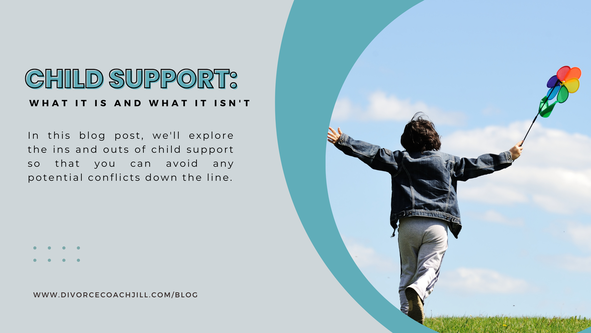|
Divorce is a process that brings up intense emotions such as anger, sadness, fear and worry. While it's natural to feel overwhelmed during this period, avoiding common mistakes can help make the journey smoother and more manageable. In this blog, we'll explore some essential tips to help you avoid pitfalls and make informed decisions when going through a divorce.
1. Seek Professional Guidance One of the most significant mistakes people make during divorce is they hire an attorney to start their divorce process. If you hire an attorney, your spouse will hire an attorney and you’ll become adversaries. You’ll be spending money on every email, phone call and court motion. In addition, attorneys typically don’t have expertise in finances or parenting. It’s much more efficient to hire an experienced divorce coach who can help you understand the divorce process and how to best utilize your attorney and other divorce professionals. 2. Understand Your Finances Gaining a comprehensive understanding of your financial situation is crucial when going through a divorce. Take the time to gather all relevant financial documents, such as bank statements, tax returns, and mortgage statements. Create a complete inventory of assets, liabilities, and debts. If your financial situation is complicated, a Certified Divorce Financial Analyst is a great resource to help you understand your finances. Knowing your financial standing will empower you to make informed decisions about property division and spousal support. 3. Prioritize Your Children's Well-being Another big mistake people make is to talk to their children about the other parent in a negative way, telling them details about the divorce process or relying on them for support. Instead, make sure you shield them from all of the details of the divorce process and let them know that you’re there for them. Focus on creating a stable and nurturing environment for your children so that they can adjust in a healthy way. 4. Keep Emotions in Check Divorce is emotionally charged, but letting your emotions drive decisions can lead to regrettable choices. Try to maintain a level head and stay as objective as possible. Seek support from friends, family, or a therapist to help you process your emotions in a healthy way. 5. Wait to Date Going through divorce can be lonely and stressful. It’s tempting to distract yourself by starting a new relationship. But jumping into a new relationship is just going to complicate things and won’t allow you to heal or focus on your kids. It’s best to wait until you’re emotionally ready to date – which means that you’ve fully grieved the breakdown of the marriage and you’ve learned to be happy on your own for a little while. That doesn't mean that you can't go out on a date when you don't have your kids. Just take it really slow and don't get serious too soon. 6. Focus on the Future Dwelling on the past when you’re divorcing won’t help you heal and move forward. Shift your focus to the future – what do you want in the next chapter of your life? What do you want to do differently? Set goals and create a post-divorce plan for yourself. This can include financial, career, and/or personal goals. Having a sense of purpose and direction can help you move forward with confidence and optimism. Going through a divorce is never easy, but by avoiding common mistakes and taking a proactive and thoughtful approach, you can make the process more manageable. Seek professional guidance, prioritize your children, manage your emotions, wait to date, and focus on the future. Remember that healing takes time, and with the right support and mindset, you can emerge from this challenging chapter of your life stronger.
11 Comments
When a marriage or any relationship is over, it can be difficult to communicate with each other in a productive way. There are so many emotions that are left over from your past experience that it’s hard to put that aside those emotions and focus on the present and future. It’s likely that your ex has a pattern of responding to you that isn’t healthy and it’s easy for you to become triggered and emotional. Then you react in an emotional way and before you know it, you’re escalating into old fighting patterns.
But there are specific ways to communicate with your ex that will prevent you from falling into old bad habits. Here are three steps to more positive communication with your ex: Step 1: Start with something positive, specific and connecting to reduce the reactivity of your ex. Here are some examples:
You want to show them that you’re coming from a place of respect and collaboration. You’re sending a clear message that this is not an attack. This may be awkward at first but it will get easier with practice. Step 2: Be clear and specific when you’re asking for something Qualifiers like, “I was wondering” or “I’m just checking” or “I think” lead to confusion. It can sound like the subject is up for discussion. Cut out any superfluous words and use clear statements like:
This will enable you both to understand what the purpose is for the communication and there will be less misunderstanding. Step 3: Tie it up with a positive short sentence:
Then end with, “Enjoy your day” or some other positive ending. These steps can be used in person or by email. There’s less of a chance of the conversation going in the wrong direction if you’re communicating by email so that’s a safer way to start out. Once you’ve been using these steps for a while, you’ll see how you and your STBX can be interacting in a totally different way than you have in the past. You and your children will be happier and much better off! Divorce is never easy, and it can be particularly challenging for parents. The process of separating from a partner can be fraught with emotion and conflict, making it difficult to come to an agreement on key issues. However, a friendly divorce is possible, even when you have children together. By approaching the process with an open mind, having clear communication, and a willingness to compromise, it’s possible to reach a resolution that is amicable and respectful to everyone involved.
Divorce coaching can be a valuable tool for parents looking to have a friendly divorce. A divorce coach is a trained professional who can provide guidance and support throughout the divorce process, helping individuals manage their emotions, communicate effectively with their ex-spouse, and work toward a resolution that meets everyone’s needs. We can also help parents navigate the practical aspects of divorce, such as developing a parenting plan, dividing assets, and creating a financial plan for the future. To have a friendly divorce, it’s important to approach the process with a mindset of collaboration rather than competition. This means being willing to compromise on certain issues, listening to your ex-spouse’s perspective, and being open to creative solutions that work for everyone involved. By focusing on shared goals and mutual respect, it’s possible to reach an agreement that meets everyone’s needs without resorting to hostility or litigation. Clear communication is also key to a friendly divorce. It’s important to communicate your needs and desires clearly and honestly and to listen carefully to your ex-spouse’s concerns. This means avoiding blaming or shaming language and instead focusing on finding solutions that work for everyone. A divorce coach can help parents develop effective communication skills and provide guidance on how to have difficult conversations with their ex-spouse. If you’re considering a divorce and want to have a friendly and amicable process, I can help. As an experienced divorce coach, I offer personalized guidance and support throughout the entire divorce process. I help clients manage their emotions, communicate effectively with their ex-spouse, and work toward a resolution that meets everyone’s needs. With my help, you can have a friendly divorce that allows you to move forward with confidence and a plan for a brighter future. To contact me for divorce coaching, visit my website at www.divorcecoachjill.com. You can schedule a consultation to learn more about my services and how I can help you through this challenging time. With my support and guidance, you can have a friendly divorce that allows you to maintain positive relationships with your ex-spouse and co-parent effectively for years to come. Divorce can be a challenging time for parents, particularly when it comes to co-parenting. It's important for parents to be able to put aside their differences and work together for the benefit of their children. Here are three tips to help you successfully co-parent during and after divorce:
Communicate effectively. Communication is key to a successful co-parenting relationship. It's important to be clear about your expectations, to listen actively to each other, and to find respectful ways to resolve disagreements. Try not to bring up the past and to keep your discussions focused on your children. Your relationship with your soon-to-be-ex has changed from one where you were connected on an emotional level to a relationship that's more like colleagues or co-workers. It can also be helpful to set aside specific times for communication, such as weekly check-ins or regular meetings to discuss important parenting issues. Be consistent. Consistency is critical to successful co-parenting. When children have the same rules and routines in both households, they feel more secure and stable. Consistency also helps parents to avoid misunderstandings and disputes. Try to agree on important issues such as bedtimes, meal times, and homework routines, and stick to them as much as possible. Focus on your children's needs. The most important thing is to put your children's needs first. When making decisions about your children, consider what's in their best interests, rather than what's easiest for you or your ex. It may not be easy to be together for your child’s birthday or at their school events, but you need to put your feelings aside for the moment and treat each other with respect. This can be especially challenging during the divorce process, when emotions may be running high. However, it will be good for your children in the long term. Plus it will get easier when you’re not in the middle of the divorce process and time has gone by. If you're struggling with co-parenting during a divorce, consider reaching out for help. For over 20 years I’ve helped parents create the environment they need to foster healthy communication and well-adjusted children and I’d love to help you! Final Thoughts Co-parenting during a divorce can be challenging, but with effective communication, consistency, and a focus on your children's needs, it can be a positive experience for both parents and children. If you need help, don't hesitate to reach out for support! For individuals going through a divorce, the holidays can be a challenging time. Finding ways to manage the difficulties of a divorce during the holidays is possible. The following helpful tips can make your holiday season a happy one.
Surround Yourself With Family and Friends Regardless of the time of year, going through a divorce can be an extremely emotional and lonely time. Surrounding yourself with family and friends is a great way to feel supported while going through a divorce during the holidays. Close family and friends will want to be supportive as you go through divorce. But they may not understand how isolating the holiday period is. Even if it’s a little uncomfortable, reach out to close family and friends to let them know you’re struggling. Tell them that you don’t have plans or that you’ll be alone. Being with family and friends can improve your mental health and keep your mind busy with something other than the divorce. Plan something fun with people you’re close to and you’ll start seeing a positive future for yourself and your children. Make New Traditions While the holiday season is always filled with traditions, going through a divorce is bound to change them. Making new traditions will help families who have children keep the holiday spirit and distract them from the challenges of change. It may be the first time your kids are spending the holidays with one parent instead of two so having new activities planned can help them better adjust to this new time in their life. Take Care of All the Logistics Make sure to take care of as many logistical aspects of parenting time before the holidays. When you’re dealing children and all of the busyness of the holiday season, it’s critical to get the parenting schedule settled way in advance. With the help of an experienced divorce coach, you can make sure that you’re prepared so there won’t be any last minute conflicts and you’ll be able to enjoy the holidays without stress. As you’re going through divorce, you probably won’t have a set parenting schedule. You may want to avoid speaking to your STBX about this, knowing that it will be a tense conversation. But avoiding the conversation only makes things worse. If you don’t want to speak to your STBX, email is a great way to communicate. Have your divorce coach or a trusted friend read over the email before you send it. While it may be stressful, planning ahead makes it easier on everyone. Children benefit when they know what the schedule is. Communicate with your children about holiday schedules to alleviate any guilt or sadness they may be experiencing for spending the holidays with one parent versus both. You Can Have a Happy Holiday Season as You Divorce! Reflecting on the past around the holidays is common, but it’s crucial to try to put the past where it belongs - in the past. When going through a divorce during the holidays, try to think of the future and make a list of all the things you want to do in the next year. Getting excited for new experiences is a great way to let go of the sadness around divorce and start moving forward in your life. If you put the past in the past and focus on the future, it will be easier for you to develop new traditions with your friends, family, and children and will enable you to be grateful and enjoy the present. Divorce is complicated and men are faced with specific issues that they deal with when going through a divorce. Here are 6 guidelines for men who are getting divorced.
1. PLAN AHEAD Whether you are the one who decided to divorce or not, it’s essential that you have a plan on how you’re going to get through your divorce. You can save thousands of dollars and a ton of time and heartache by having a plan for your divorce process. Below are some pointers to help you prepare and plan for your divorce:
2. STAY CIVIL WITH YOUR EX If you're hoping to negotiate your way through your divorce, which is the process that I recommend, it's extremely important to be civil to your soon-to-be-ex (STBX). Put your emotions aside for now and focus on communicate effectively with your STBX. It's important to stay calm and avoid being provoked by any aggressiveness or hostility. Divorce causes people to become emotional so empathize with your ex and understand that they’re going through a lot. It's also important to watch your tone and keep your anger in check. Remember, the goal is to make the process as amicable as possible, especially if you have children. By keeping these things in mind, your divorce process will be much less stressful and more likely to produce a favorable result. 3. DON'T MOVE OUT IMMEDIATELY It’s not pleasant to live with your STBX while you’re going through divorce. Many men will be quick to move out of the marital home because they think that it’s their responsibility to move out and let their children’s mother have the home. But that’s not usually the best solution because in many cases, the court will assume that the first spouse to leave the marital home needs it the least. In addition, moving out makes it more difficult to see your children and get property that you’ve left at the house. Of course, this isn't always possible or practical. If you and your wife are having difficulty living together, it may be best for everyone if you give her some space by moving in with a friend or relative. But if you can hold out until you have an agreement, you won’t have to worry about access to your children or your property. 4. HAVE A SOLID PARENTING PLAN WITH YOUR STBX Your parenting plan is the structure for how and when you’ll see your children after you divorce. Many dads don’t realize how important they are to their children and will give their children’s mother more time than they want to. Children need both parents in their lives so make sure that you have a significant amount of time with your children written into the parenting plan. If you have joint custody of your children, try to make decisions together about their care and education. Respecting each other's parenting styles and schedules is important. By working towards positive co-parenting, you can help your children adjust to the divorce and ensure they have the support they need from both parents. 5. UNDERSTAND YOUR FINANCES Most people don't think about the financial aspects of divorce until they're in the middle of it. But if you're getting a divorce, it's important to be as prepared as possible financially.
6. NEVER SAY ANYTHING NEGATIVE ABOUT YOUR STBX IN FRONT OF YOUR CHILDREN When you say something negative about your children’s other parent, it hurts your children. If you really want to put your children as your priority, you will support their relationship with their other parent. Children love both of their parents and don’t want to be caught in the middle. Studies have shown that children are hurt emotionally when their parents have a bad relationship. Even if your STBX doesn’t communicate well with you, it’s your responsibility to do the right thing. Ignore the negativity, take a break to collect yourself and respond in a respectful way. It takes two people to fight so if you’re not participating in it, it won’t go anywhere. You’ll never regret taking the high road and your kids will benefit. Final Words You are not alone in this process; there are people who can help you through it. Seek out resources like a divorce coach, a therapist and a divorce support group to help you through this difficult time. And remember, the decisions you make during your divorce will impact the rest of your life, so take your time and make sure you make choices that are best for you and your family. When a couple decides to divorce, it's an extremely emotional and challenging time. One of the most important decisions they will make is how to proceed with the separation process.
Many divorcing couples opt for mediation because it is one of the most effective and least expensive divorce processes. If you want to get your spouse on board to mediate your divorce, there are a few things you can do. Focus On How It Can Benefit Both Of You There are many benefits of mediation, especially when compared to going to court. Mediation is typically less expensive and quicker than going to court, and it also allows the parties to have more control over the outcome. In addition, mediation can help to preserve relationships and allow the parties to move on with their lives more quickly. The mediator is impartial and doesn't take sides but facilitates communication and helps the parties find common ground. Because mediation is more collaborative than adversarial, it can often resolve complex issues more quickly and much more effectively than litigating your divorce through the courts. If Your STBX Doesn't Want To Talk, Find Other Ways to Communicate Divorce can be incredibly challenging when couples are not on speaking terms. In addition to the emotional toll, there can be confusion and misunderstandings. It’s important to find a way to communicate, either through email or text. Let your STBX (soon-to-be-ex) know that 95% of divorces don’t go to trial and that mediation is one of the most effective way to avoid a trial. An experienced mediator can provide guidance and support throughout the process and offer resources that can help couples resolve their differences. If your STBX is against mediation in the beginning of your divorce, allow for some amount of time to pass before you bring up mediation again. As people learn more about the divorce process and how expensive attorneys are, they usually become more reasonable with respect to mediation. Make It About Your Kids Trained family mediators can assist you in developing communication and conflict resolution skills during their sessions. This can be extremely helpful after divorce, as both parents must be able to communicate effectively to constructively resolve conflicts for the good of the children. The mediator can help you understand the root causes of the conflict, develop a plan for dealing with future disagreements, and create a parenting plan that is in your child's best interests. With the help of a mediator, you can learn to co-parent effectively and create a healthy environment for your child. Never Force The Issue It's important to remember that mediation is a process for couples who want to resolve their differences amicably. Trying to force your spouse to participate will only lead to frustration on both sides. Take a step back and let some time pass. Revisit the issue after you both have had time to educate yourselves and understand what your options are. Final Words Mediation may be the best option for you if you are considering divorce and want to do it in the most amicable way possible. Mediation allows both parties to agree without going to court and often results in a fair settlement for everyone involved. In order to be on the same page as your spouse, it may take time, patience, and education for you to both agree that mediation is the best option for your divorce. child support: what it is and what it isn'tAs you go through divorce, it’s important to understand what child support is. In this blog post, we'll explore the ins and outs of child support so that you can avoid any potential misunderstandings down the line.
Child Support is Calculated Using a Formula In the United States, child support is typically calculated using a formula that considers both parents' income, the number of overnights with each parents per year, the amount a parent pays for medical insurance and the number of children involved. The specific formula varies from state to state, but the general idea is that the parent with the higher income will pay child support to the parent with the lower income. Child support is intended to cover food, clothing and housing. Other child-related expenses must be worked out between the parents and put into their agreement. Child Support Isn't Tax-Deductible Many people are surprised to learn that child support payments are not tax-deductible. This is because the payments are intended to cover the costs of raising a child, which are not considered business expenses. The IRS considers child support a personal expense, like rent or groceries. Failure To Pay Child Support Brings In Legal Consequences If you fall behind on child support payments, the other parent may take you to court. The court may then order that your wages be garnished or that your bank accounts be frozen. You may even be ordered to pay a fine or go to jail. In some cases, your driver's license may be suspended. The Age that Child Support Ends Varies by State In the United States, the age a child is emancipated, or becomes an adult in the court’s opinion, is when child support ends. This age varies by state - for example, in Colorado, child support ends when a child is 19 years old and in New Jersey child support ends when a child graduates from college, if the child is attending college. In many states child support ends when a child reaches 18 years old or graduates from high school, whichever comes later. There are exceptions to these rules, such as if the child has a disability that prevents them from becoming self-sufficient. College Expenses Are Not Included In The Calculation The cost of college is a major expense that is not included in the child support calculation. This can burden parents struggling to pay for their child's education. There are a few reasons why college expenses are not typically included in child support calculations:
Having No Job Doesn't Mean A Parent Doesn’t Have To Pay Child Support A parent is responsible for paying child support if they don't have a job. The court will consider many factors when determining the ability to pay, including the parent’s income, assets, and expenses. How much the parent pays is based on their ability to pay, not their employment status. If the parent doesn’t have a job, the court may impute income based on their past or potential earnings. Final Thoughts It’s important for parents going through divorce to understand what child support is, how to calculate it and what it doesn’t cover. You can find your state’s child support calculator and input the information that’s needed to get a good idea what child support amount you’re going to pay or receive. Once you know the child support amount, you can then calculate the other pieces of your financial picture. Understanding child support is a critical part of your overall financial settlement. If you need help with any of this, reach out to an experienced divorce coach who can walk you through all of this. When going through divorce, parents can get swept up in the divorce negotiations and not recognize the impact on their children. It’s important to know how to prioritize your children’s needs as you go through your divorce process. Following are some things to consider:
1. Kids can be ok, even in divorced families. The main predictor in positive outcomes for children is how much conflict there is between parents, not whether or not the parents are divorced. Therefore, if you stay in a marriage for the children but there is conflict and tension in the marriage, you’re not helping your children. On the other hand, if you get out of a high conflict marriage and have two happier parents who aren’t in conflict with each other, your children can be better off. 2. Compromise to lessen conflict with your soon-to-be-ex (STBX). If your STBX isn’t being reasonable and your attorney is telling you to fight for what you deserve, choose your battles wisely. Just because your attorney tells you to fight for something, doesn’t mean you should. You have to weigh the negative consequences on your children before you decide to fight with your STBX. For example, many of my clients have had their attorneys push them to do something that increases the conflict with their STBX. Attorneys may not realize the negative emotional impact of conflict on you or your children. Think about your children as you’re negotiating your agreement and, if possible, lessen the conflict. 3. No matter how your STBX treated you, it doesn’t mean they won’t be a good parent. If your STBX treated you poorly during the marriage, it doesn’t mean that they’ll treat your children the same way. Support your children’s relationship with their other parent as long as their other parent is not abusive. If your child is having difficulty with the relationship, you may be tempted to pile on - saying, “Isn’t he/she horrible?” Instead, encourage your children to talk to their other parent about how they feel. 4. Don’t focus on what’s fair, focus on what’s best for you and your children. There are issues that need to be worked through and it may not feel fair. But you have to compromise on so many things – it rarely feels fair. For example, when you’re going through divorce, it may not feel fair to give 50% custody to a parent who didn’t take on 50% of the childcare before the divorce. However, if both parents are willing to step up, that’s better for your kids. Putting your children’s needs first isn’t always easy but as caring parents it must be the priority. Focusing on your children’s needs while you’re going through divorce can take a tremendous amount of self control. Make sure that you’re getting support so that you can think clearly and make decisions that put your children first. You’ll feel better and your children will benefit. Making the decision to divorce brings with it so many emotions - sadness, anger, fear, anxiety, shame just to name a few. And as you’re managing all those emotions, you also need to figure out how to navigate the divorce process, which can be completely overwhelming. So how do you manage your emotions so that you can make logical decisions throughout your divorce process? Consider the following:
Children need structure, even as their parents are divorcing. Many parents feel that they can’t discipline their children because they’re dealing with so much emotionally. But by having clear, defined limitations for your children, it will help your children feel safe and secure which they need, particularly when they’re parents are divorcing.
While maintaining clear rules and limits is important, it’s also important for parents to choose their battles. Now is not the time to be extremely strict or add new rules. Start with one or two of your most critical rules and let your children know what they are. Make sure that they’re used to them before adding more. Give your children about 2 weeks to get used to a new rule before adding another one. It’s also important to involve children in determining what the rules are. Let them make some of the rules themselves and try to come up with some together. You can even add some fun ones like, “Anyone who’s sad gets to choose what’s for dessert.” Post the rules somewhere in your home where everyone can see them. This enables everyone to be on the same page and avoids miscommunication. Too many parents focus on negativity and punishment. If you recognize appropriate behavior and focus on the positive, your children will respond better. Even if there is only one thing that your child does that’s positive, point that out. Children gain so much more from positive reinforcement than negative attention. Remember to work with your children’s other parent and not against them. You can have different parenting styles as long as you respect each other’s differences. Children don’t need you to be aligned on everything but they do need you to both message them that tell they must respect the other parent. Children do best when both parents are involved and they have a good working relationship with each other. You don’t have to be best friends with your children’s other parent, you just need to work effectively with each other. Raising children isn’t easy and when the family is going through divorce, that creates even more complications. However, if you maintain structure for your children, choose your battles, focus on the positive and have a good working relationship with your children’s other parent, you are well on your way to having happy and healthy children. While the holidays can bring excitement, they can also bring stress, especially when a family is going through divorce. Families struggle around who to spend the holidays with, what traditions to continue and what new traditions to begin.
Here are a few tips on how to not only survive the holidays, but create holiday memories that will be happy and long-lasting, even if your family is going through divorce. 1) Focus on what’s best for your children Regardless of what each family or divorced parent wants to do, the priority should always be on the children and what’s best for them. This means that if your son or daughter wants to go to your exes’ house to visit grandma, you need to put aside your feelings towards your former partner and be supportive. This can be difficult, as you navigate the sadness, loneliness or other difficult emotions. Take this time to get emotional support from your support system. If you don’t have one, build one by joining a support group, finding a therapist or divorce coach or reaching out to friends and family. Don’t punish your ex or use your children as bargaining chips. If you won’t allow your children to see their other parent during the holidays, and your children want to, you’re hurting your children. Try to carve out some time – maybe an hour or two – for them to see each other. While this is difficult, it is best for your children. And it will create a better co-parenting relationship for the future when you’ll ask something of your ex. 2) Have a clear plan Talk to your ex in detail about what the holiday will look like, the schedule you will stick to as well as pick up and drop off times. Remember there will be a lot of compromise needed from both ends. It may help to write it in an email so that you can refer back to it if necessary. Remember, communication is key for this to work. 3) Prepare your children for the changes The way that you celebrate this holiday will be unfamiliar to your child which can create stress for him or her. It’s important that you talk to your children and tell them what to expect this year. Unlike other years, this holiday will be split between two homes or it might be spent with one person’s family on Christmas eve and another’s on Christmas day. Ask your children questions – how are you feeling about the holiday? What would make it easier for you? What are you most excited about? What are you least excited about? When children are given the chance to openly talk about their feelings, they feel less anxious. Tell them to have fun with the other parent and to enjoy their time and don’t make your child feel guilty about spending time with your former partner or their family. Reassure them that you will be ok when they’re not with you. The main goal of the holidays is to spend time with your loved ones, and that’s exactly what you should be encouraging your children to do. 4) Have patience with the changes and be kind to yourself The loss of the intact family will be an adjustment hurt for everyone, but it won’t be as difficult as time passes. As you move forward, you’ll choose which traditions to keep and you’ll make new ones. Children are extremely resilient and will look forward to your new traditions and getting to celebrate with both families in different ways. One of the most challenging adjustments for a family going through divorce is having two separate places to call home. This abrupt change can be confusing to children as well as stressful. Portraying the new change as exciting as opposed to something upsetting can help the adjustment go a lot smoother – the excitement of a new home, a new bedroom to decorate, a new neighborhood to explore and new friends to make.
Regardless of whether you're setting up a new address or maintaining the present one, there are several things you can do at home to help your children adjust to all of the changes. Here are a few suggestions: 1. Let your child have a say. If you’re establishing a new home, involve your child in decorating their new bedroom such as picking the color scheme, what sheets they want or posters they want to hang on the walls. If it isn’t possible for each child to have his or her own room, they can have their own space in a room such as their own dresser, shelf space or toys area that is exclusively theirs. They should be allowed to choose what they keep at each house and take items between each as well. How does this help? It creates a sense of belonging in both homes. Many children enjoy having two homes because they get extra attention, which sometimes means having two birthday parties and two sets of Christmas or Hanukkah gifts. 2. Make the new place feel familiar. Too many sudden changes can be overwhelming to a child, but they’ll feel a sense of comfort in their new environment with some familiar belongings around them. If there's something special at your former home that you know he or she adores (a special night light, a photo, or a teddy bear), try to purchase it for the new house or make sure it's always in their "go bag" that travels with them from house to house. Even ordinary items like books, clothes and princess decorated plates can make your child feel more at home. 3. Come up with a packing plan. When your children transition from one house to another, sometimes they’ll forget things. To prevent a melt down, both homes should always have extra toiletries, pajamas, spare clothing, books, and movies on hand. Some schools even provide children who have two homes with two sets of books. Also, help your younger child pack their bags the night before the transition. Overall, the child should be allowed to carry their things back and forth between houses without conflict or tension with parents and parents should cooperate in returning any clothes or toys needed when switching between either home. While you’re starting the parenting schedule with your children, it’s so important to let your child have a say in their new environment, make the new home feel familiar, have a packing plan and try to be patient. This transition is just as difficult for your child as it is for you and by being patient when they forget things and are getting used to their new schedule, you are strengthening your relationship with them day by day. Co-parenting effectively is important for your children’s well-being as well as for your own. In many cases co-parenting can be a challenge because going through divorce is one of the toughest experiences in life and both parties may feel overwhelmed and emotional. However, there are ways to co-parent where you can help your children grow and develop into happy and healthy adults.
Lay the groundwork: Letting go of the past and consciously choosing to approach the relationship as co-parents rather than exes can help make co-parenting easier. If you can let go of the past, it will help you put your emotions aside when you’re interacting with your ex. Work on being respectful and kind to your child’s other parent - it will go a long way toward having a productive co-parenting relationship. Refraining from judgment and standing your ground: Realize that it’s ok for each parent to have a different style of parenting, and you should be respectful of each other’s views. Instead of cutting down each other’s parenting, “She’s too strict,” or “He’s coddling them,” realize that it’s normal for children to have to adapt to different styles even when switching between homes. There’s no one right way to deal with parenting issues. Try to give up your firm view of how to parent and compromise with your co-parent whenever possible. Remember you’re doing this for your children, not your ex. Collaborating to support your child. Collaborate with your child’s other parent by communicating with them about important things that come up. For example, if your child got hurt during school or didn’t feel well when they were with you, letting the other parent know will help develop trust between you. See the good in both parents - yourself and your ex. Recognize that each of you have good qualities that are good for your children. One parent may be crafty and do arts and crafts with the children while the other is better at teaching them math. Point out these differences and appreciate them about each other. Talk to your children about being grateful about having parents who have different strengths. Focus on the positives and let go of the negatives. When you can work as a team with your co-parent for the benefit of your children, it will pay off. Communicate, compromise and focus on the positive and you’ll be able to become an effective co-parent and help your children grow into happy and healthy adults. Living with your STBX (soon-to-be-ex) is really hard! If you have children together, that makes it even more difficult because you're going to have to learn to communicate and work together. The good news is you won't be living together forever and I’m here to give you some solid help on how to live together during divorce more effectively.
The biggest key to navigating living together during divorce is to make some ground rules! Rules can protect each of you and provide boundaries during a time when things could get heated really quickly. Here are some ground rules that work well for other couples living together during the divorce process:
I hope these ideas help you navigate this tough time period that you’re in the same house with your STBX. These suggestions will help make this time less painful for you, your kids and your soon-to-be-ex. |
AuthorJill Barnett Kaufman is a Divorce Coach, Therapist, Parent Educator and Divorce Mediator. She is an experienced professional who helps clients discover new ways to resolve a variety of challenges when considering divorce, starting the process of divorce or are already divorced. Archives
March 2024
Categories
All
|
|
|
|
Connect with us:
To get more information, click the button below:
For our privacy policy, click here, for our Terms of Use, click here and for our Disclaimer, click here.
|

















 RSS Feed
RSS Feed
